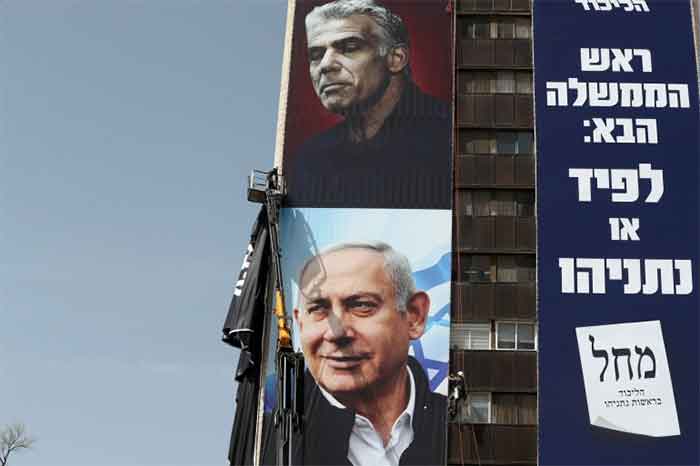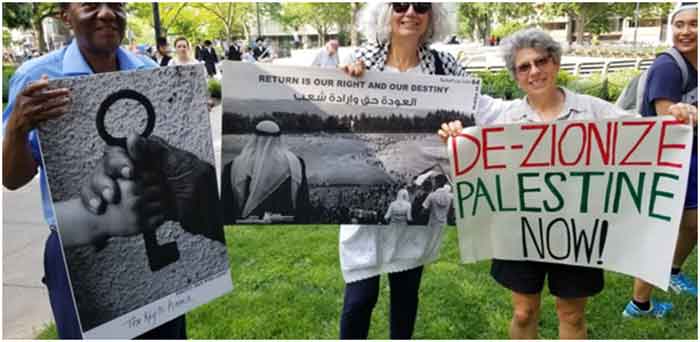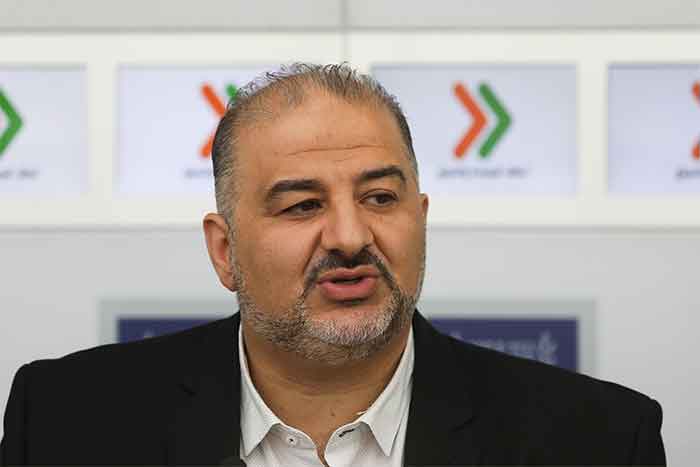
It was that time of the year last month, that Israelis rushed to the ballot lines to express their democratic right to vote for the Israeli parliament – the Knesset, for the third spring in a row. Israel takes pride in its “Jewish democracy” and claims that it does not discriminate non-Jews, while in fact it uses its engineered Jewish majority to retain its discriminatory laws and policies. That Jewish majority was achieved through ethnic cleansing and is maintained through discriminatory immigration laws and denial of refugees right of return. In essence, through a seemingly democratic process of elections, the Jewish majority elects a Jewish government that works to maintain the apartheid status quo in the best case, and makes non-Jewish discrimination even worse most of the times.
For the few anti-Zionist Israelis like me, there seems to be an alternative to voting for a Zionist party: One can vote for an Arab party. There are 4 major Israeli Palestinian political factions, sometimes running united under the Joint List title, and this year they ran in two heads, the Joint List consisting of 3 of them and Ra’am running separately. However, after examining the Israeli politics and their projection on Palestinian politics within Israel, I came to the conclusion that even voting for those parties only serves the discriminatory apartheid Israeli regime and actually harms the Palestinian cause more than it helps. In the rest of this article, I explain why.
***
Four days before the recent Israeli elections, IDF soldiers killed Atef Hanaysha from the town of Beit Dajan near Nablus, while participating in a protest demonstration over the expropriation of the town people’s lands for the purpose of a Jewish settlement’s expansion. Another cold-blooded (alleged) murder of an unarmed and non-dangerous Palestinian demonstrator by a young Israeli who will not pay any price for it. A matter of routine.
In the political system, as expected, no response was recorded. Not on the right, not in the center, not on the Zionist left. There I did not even bother to look for a response. But even within the Arab parties I found no response! Well, Israeli citizens but yet Palestinians… that got me looking into the relationships between Israeli-Palestinian politicians and the West Bank and Gaza territories and the societies living there under military occupation.
In fact, the Arab parties in Israel are hardly involved in what is happening in the West Bank and Gaza. Palestinian MKs rarely come to the West Bank, do not participate in demonstrations, do not assist Palestinians facing the military occupation regime, and hardly talk about it, beyond the “end the occupation” slogans that have already lost actual significance. There is a clear reason for this: Palestinians in the West Bank and Gaza, as well as Palestinian refugees in the Diaspora, are not entitled to vote in the Israeli Knesset elections, and Palestinian MKs rely only on the vote of the Palestinian minority among Israeli citizens. Fighting for the collective rights of the entire Palestinian people does not serve the Palestinian citizens of Israel in the short term, so for electoral reasons of political survival the Palestinian MKs are effectively barred from engaging in it and they concentrate on the struggle against discrimination against their fellow Palestinian Israeli citizens, where they already have their hands full.
The West Bank and Gaza are officially considered “Palestinian territories” under Israeli occupation. The Jewish MKs from the right-wing parties are very present and active in that arena, and some of them even live in the West Bank. They deal with it on a daily basis, and it is a significant part of their agenda. Much less so are the MKs from the Zionist left, who occasionally express their objection to the escalation in the expropriation of Palestinian territories and the expansion of settlements and outposts (as acts that might, God forbid, harm Israel’s international status and “Jewish democracy” image). The Palestinian MKs refrain from activity in this arena altogether, and this requires an examination of the role of the Arab parties in the Knesset.
On the home page of the joint list’s website appear “Our Principles” – a list of four principles, the first of which is:
A just and stable peace based on the withdrawal from all occupied territories and the establishment of a Palestinian state on the side of Israel with East Jerusalem as its capital: immediate response to the Arab peace initiative, supported by most countries in the world; Implementation of UN resolutions on the Israeli-Palestinian conflict.
The joint list says “all occupied territories” and refers only to areas beyond the Green Line (the Jordan-Israel border between 1949-1967). It supports the establishment of a Palestinian state on the basis of that line but does not consider itself part of that state, when it would be established. In a meeting this year with MK Aida Tuma-Suleiman from Hadash (in my opinion one of the best MKs in Israel in recent years) I asked if she sees herself more as a Palestinian or as an Israeli. Her answer was that she was first and foremost a Palestinian. When I asked her in which state she sees herself in the two-state solution that her party advocates, her answer was that she sees herself as part of the State of Israel, as “here I live and here is my home”.
Tuma-Suleiman’s remarks illustrated to me the role played by the Arab parties in the Knesset of Israel within the framework of the Israeli occupation and apartheid regime. Israel pursues a “divide and conquer” policy designed to undermine and loosen the Palestinian people and divide them into separate communities that cannot wage a common liberation struggle, while allowing each to act to some degree for its own sake, but without the ability to cooperate and unite against the ruling Israeli regime.
- Palestinian citizens of Israel, who enjoy civil rights (although limited relative to the Jewish citizens) and are entitled to vote for the Israeli parliament. They are represented in the apartheid parliament by Arab parties, which are supposed to deal only with their “internal community issues” and operate under the premise of recognizing the State of Israel as the state of the Jewish people in the Land of Israel. A person who questions the justification of Israel being a Jewish state is in fact disqualified from serving in the Knesset, thus the Arab parties are directed to narrow the scope of action for Israeli citizens only, only from whom they can obtain votes in elections.
- Palestinian residents in the occupied West Bank, living under a military regime. They are represented by the “Palestinian Authority”, which is sponsored by the Israeli occupation and operates in full security coordination with Israel, and serves as an arm of the occupation – it can manage the internal civil affairs of Palestinian residents in the West Bank, but not much beyond that.
- Palestinian residents in the occupied Gaza strip, living under a firm blockade by Israel with an internal Hamas regime. Although Hamas does not cooperate with Israel like the Palestinian Authority in the West Bank, it also operates under a tight siege, close supervision and severe Israeli restrictions, which prevent it from cooperating with parties outside Gaza in a joint struggle for liberation.
- Palestinian refugees abroad, living without civil rights in refugee camps in neighboring countries, or citizens of foreign countries – some of whom strive to exercise their right of return (which essentially exists regardless of their desire to exercise it). They have no practical political representation (although officially can be seen as represented by the PA), and Israel does not even recognize their status as refugees and does not recognize their right of return.
Within this mosaic, the Arab parties in the Knesset of Israel have a defined and confined role, similar to the PA in the West Bank and the Hamas government in Gaza – to serve the Palestinians “within their area of responsibility”.
The Arab parties in the Knesset have no mandate to act in the Israeli parliament for the Palestinian people as a whole, but only for the interests of their voters within the Jewish state. They have no mandate to challenge the definition of the state as a Jewish state. Even if these parties are not Zionist, their activities cannot be defined as anti-Zionist. In recent years, there has been a trend toward the Israelization of Palestinian citizens of Israel and the differentiation of this group from the rest of the Palestinian people in the activities and rhetoric of the Arab parties. This is reflected, for example, in the willingness of the joint list to support Benny Gantz (AKA “the butcher from Gaza”) for becoming the Prime Minister. And this is reflected in the willingness of The Ra’am party to negotiate with Netanyahu on a political deal in which there is no representation of the interests of Palestinians who are not citizens of Israel. In doing so, the Arab parties in Israel are serving the Zionist enterprise and harming the Palestinian national interest, as well as the vision of a state of all its citizens between the river and the sea – in which I believe.
The joint list is a sectoral faction that works mainly to promote and improve the situation of the Palestinian citizens of Israel without challenging the definition of the state as a Jewish state. It adopts the “two-state solution” (that became infeasible anyway) which is a recognition of a Jewish state with built-in non-Jewish discrimination over most of the land of Palestine. Moreover, the two-state solution also does not serve the interests of Palestinian citizens of Israel, because it makes them by definition a national minority of a foreign (and most likely hostile) state within Israel. The residents of “the triangle” (an area in Israel adjacent to the green line, mostly populated by Arabs) are known for their opposition to moving to a Palestinian state as part of such a solution, and it is also clear that the status of Palestinian citizens in Israel will not improve as a result of a Palestinian state alongside Israel, and (most likely) will only get worse.
The end of the occupation and the solution to the Zionist issue is the transformation of Israel from ‘the state of the Jews’ to ‘the state of all its citizens’. The phrase ‘state of all its citizens’ means not only that the state serves all its citizens equally, but also that the state does not make a selection in citizenship and that it recognizes all its natives and refugees. In my view, the talk of a two-state solution and the separation of Jews and Palestinians is wrong and does not serve the principles of justice and equality. Such a radical change will not come from the Zionist parliament, in which the threshold condition for participation is the acceptance of the Zionist idea and its realization as a racial Jewish state. (In this context, the Jewish nation-state law passed in 2018 is merely giving formal status to a long-standing policy. This is why despite the political storm it has generated – the law has not significantly changed the existing situation on the ground. It was already bad enough even without that law.)
I am a Jewish Israeli citizen, born and raised as a Zionist. Throughout my adult life I exercised my right to vote in all the election campaigns. In recent years, my political view has changed, I have abandoned Zionism and voted for the Arab parties as a counter-vote to Zionism and in solidarity with its Palestinian victims. But recently I have come to realize that the Arab parties in the Knesset also serve the Zionist interest, even if unwittingly or merely out of necessity and for the time being, and they even serve as a fig leaf for the Israeli apartheid regime. I am also familiar with the attempt to give voice to the Palestinians without the right to vote by voting for the Arab parties. But as I explained above, the joint list does not represent them and most probably a vote for it does not serve their interests.
Just as there is no point for opponents of the occupation to enlist in the IDF to “change from within” (a justification that left-leaning Zionists often use for IDF service), so in this matter as well – one cannot oppose the system itself and also participate in it actively. I am not willing to participate in a game when I do not agree to the rules of the game. The place for anti-Zionist political activity is outside the Zionist parliament. I see my avoidance from voting for the Knesset not as a passive move to abstain from influence, but as an active step of boycott. This is a parliament of an apartheid regime by definition, and my vote will not be used to legitimize that regime. I prefer to contribute it to lower the turnout rate. It is also not a step of despair, but rather of disillusionment – recognition of reality and the need to influence in more effective ways. The struggle for the liberation of the Palestinian people and the dismantling of the apartheid colony cannot take place within the apartheid parliament, and must take place in other arenas – on the ground, in the media and in the international arena. Until a democratic parliament will be established here.
Sivan Tal is a Jewish Israeli citizen, resident and anti-Zionist
GET COUNTERCURRENTS DAILY NEWSLETTER STRAIGHT TO YOUR INBOX














































